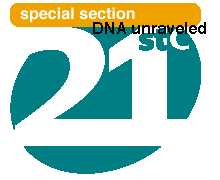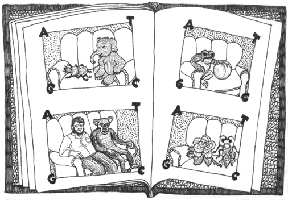

Molecular biology and the polis, or, What's worth doing well?
By ROBERT POLLACK
WE HAVE COME to understand DNA as a chemical text that instructs our bodies in all their operations while copying itself so faithfully that these instructions can be passed between generations, enabling life to persist on our planet. After these revolutionary discoveries, the information carried by human DNA will increasingly guide our politics as well as our research. Meanwhile, some of the deepest assumptions of a free society (individuality, autonomy, legal equality) have again been called into question by the work of biologists. The risks posed by investigations into the human genome come from 19th century notions of eternal progress through science, this time linked to an extraordinary power to change inheritance through the reordering of DNA.Earlier in this century, physicists pursued their discoveries while still inside a cocoon of ostensibly pure, objective science, above human frailty, beyond petty politics, motivated by curiosity and intellectual adventure alone. Though the context of their work changed, they preserved the context of their profession. That they ultimately did not live up to their own professional standards in the era of expedient anti-Semitism and atomic bombs did not keep them from passing those standards on to us. The idea that scientists ought to work at a remove from the concerns of common humanity remains powerful.
Molecular biologists ought not to repeat their mistake. Somehow, we have not thrown the switch of nuclear war a second time in the past half century. In this period of grace we have developed the capacity to read, edit, rewrite, and perhaps begin to understand our DNA texts. If we can give ourselves the time, our genomes will teach us that we are all profoundly related, all one human family. Abandoning hope of final closure on the meaning of the human genome, future molecular biologists will be free to be critics and historians, expert at multiple interpretations, even able to exchange the white lab coat for the jacket of a scholar or the blue suit of a public servant. My colleagues have never had a better opportunity to become engaged in the consequences of our science, taking responsibility for the larger results of our research along with credit for the results themselves.
But time is short. Biomedical science is about to change, whether or not scientists help steer a new course. The fundamental premise of molecular biology-that any question about a living thing can be answered, any disease understood and eradicated, by learning the detailed interactions of appropriate DNAs, RNAs, and proteins-has grown from an optimistic research strategy to the dominant agenda of a multibillion-dollar research juggernaut. Preventive medicine, public health, and universal education about the workings of the body have all been overshadowed by the dream that an understanding of molecular mechanisms would yield cures. The conquests of molecular biology have been many, but in their frothy wake, many implicit promises have gone unmet. Newborn children die in the United States more frequently than in more than a dozen other countries, including many that spend far less per person on health care than we do; cancer is not diminishing as a cause of death; and after a decade and billions of dollars, the fact that HIV is more clearly understood than any other animal virus is small solace to the million Americans who are infected with it or the many millions more who have lost a friend or relative to AIDS.
 AND CERTAIN OTHER promises, arguably, should go unmet. We cannot yet read
the DNA texts that assemble and maintain the most interesting parts of ourselves,
such as our minds, but techniques that have explicated simpler genetic texts
in transgenic mice could theoretically interpret our most complex genes
as well. Why not transgenic people? Certainly, there is no technical barrier.
The success of in vitro fertilization has shown that the one-celled human
embryo is entirely accessible: In the hours between fertilization in a dish
and placement of the fertilized egg in the mother's uterus, the human embryo
is available for the injection of any DNA sequence one might have made.
Most people recoil instinctively from the Huxleyan prospect of transgenic
children, but if a child could be born without her parents' congenital disease,
transgenic medicine might be consistent with the Hippocratic oath, benefiting
people while doing no harm.
AND CERTAIN OTHER promises, arguably, should go unmet. We cannot yet read
the DNA texts that assemble and maintain the most interesting parts of ourselves,
such as our minds, but techniques that have explicated simpler genetic texts
in transgenic mice could theoretically interpret our most complex genes
as well. Why not transgenic people? Certainly, there is no technical barrier.
The success of in vitro fertilization has shown that the one-celled human
embryo is entirely accessible: In the hours between fertilization in a dish
and placement of the fertilized egg in the mother's uterus, the human embryo
is available for the injection of any DNA sequence one might have made.
Most people recoil instinctively from the Huxleyan prospect of transgenic
children, but if a child could be born without her parents' congenital disease,
transgenic medicine might be consistent with the Hippocratic oath, benefiting
people while doing no harm.
The critical questions here are social: who decides to create the first transgenic embryos and who takes responsibility for the inevitable mistakes, which in this context mean children born with defects? Recently, scientists injected DNA for a pigment-making enzyme into a strain of albino mice; however, along with colored hair and eyes, these mice were born with malformed viscera. They died shortly after birth; careful molecular work showed that the added gene had damaged a hitherto unknown gene responsible for maintaining the usual asymmetries of the mouse's internal organs. The first experimental phases of human transgenic medicine will likewise raise unexpected questions whose answers-and the political discourse by which we arrive at them-will determine not so much the medicine of the next century as the way we will live with one another.
In a short time we will have transliterated the human genome, played out many parts of it in cells, and gotten some difficult passages translated for us in transgenic animals. Then we will begin hunting for the passages we want most to know about, the ones responsible for our humanity and, if not our souls, then our ability to imagine souls. What we have found so far suggests that it will be impossible to know ourselves this way, but we could easily do great damage to future fellow citizens by trying. As a friend once said to make me reconsider a particularly seductive experiment, if it isn't worth doing, it isn't worth doing well.
Molecular biologists have two choices. They can continue working out the meanings of individual genes, going into business for themselves with the discoveries they have made in tax-supported laboratories, shortcutting peer review using news conferences and patent secrecy, taking tax money from 40 million fellow Americans who cannot afford health insurance at all, and ignoring potential eugenic uses of their work. Or they can begin to rethink what they do and why they do it. An agenda for the next stage of molecular biology will be assembled before this century is out, in any event, because the groups who can pay for basic research-government agencies, agribusiness and pharmaceutical firms, the military, the criminal justice apparatus, would-be eugenicists-need one in order to make their own plans.
These groups will set the future of molecular biology to suit their purposes unless the scientists who would find themselves constrained to carry it out join the debate. The dream of pure and unfettered research is ultimately dangerous; despite the hopes of some of its brightest practitioners, the path of a science is not self-correcting. Only by openly sharing concerns with others and asking for the broadest possible audience to help set its agenda can science meet its responsibilities to the society that supports it.
ROBERT POLLACK is professor of biological sciences and anthropology at Columbia. His most recent book is Signs of Life: The Language and Meanings of DNA (Boston: Houghton Mifflin, 1994), from which this article is adapted. He can be reached at pollack@columbia.edu.
ART CREDIT: Amy Pollack




